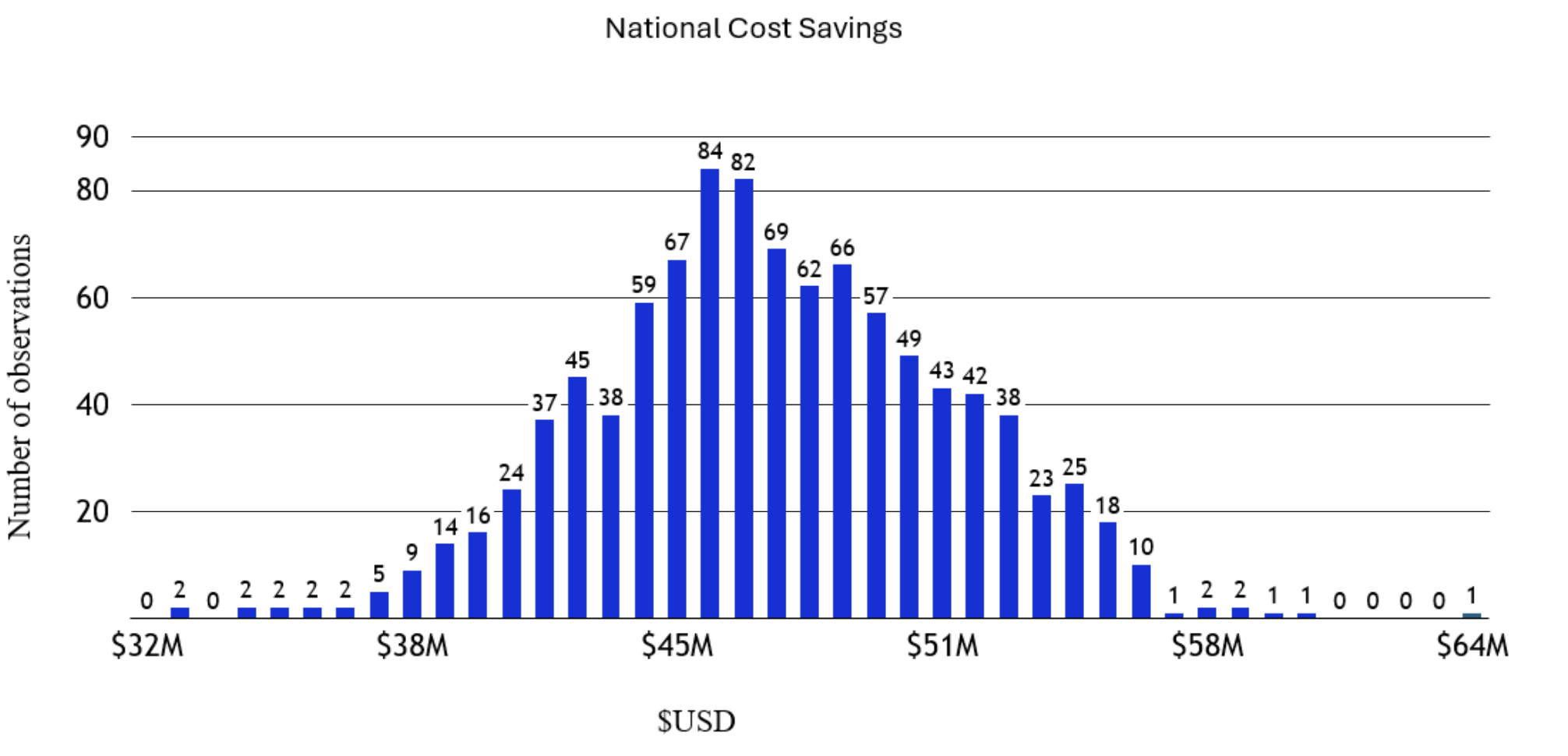Monday Poster Session
Category: IBD
P3226 - National Cost Savings From Avoidable Care for Patients With Inflammatory Bowel Disease via Multidisciplinary Outpatient Chronic Disease Management Teams
Monday, October 27, 2025
10:30 AM - 4:00 PM PDT
Location: Exhibit Hall

Shelly Bhagat (she/her/hers)
University of Missouri - Kansas City School of Medicine
Kansas City, MO
Presenting Author(s)
Shelly Bhagat, 1, Christopher W. Baugh, MD2
1University of Missouri - Kansas City School of Medicine, Kansas City, MO; 2Chris Baugh, Department of Emergency Medicine, Brigham and Women's Hospital, Wellesley, MA
Introduction: Patients with inflammatory bowel disease (IBD) often experience flares leading to emergency department (ED) visits. Acute unscheduled care and resulting hospitalizations for IBD have been associated with a lack of standard treatment pathways in the outpatient setting. Multidisciplinary care teams aim to fill gaps in current treatment regimens by reducing flare frequencies and providing a more structured, interdisciplinary, and tailored approach to outpatient IBD care.
Methods: We created and ran 1,000 trials of a Monte Carlo simulation to model the impact of the widespread implementation of multidisciplinary care teams for IBD care, using a setting of all EDs in the United States and including all adult patients with IBD as participants. Our intervention uses multidisciplinary outpatient teams for IBD care to reduce hospital admissions, high-cost imaging, and other associated costs. Our primary outcome was to estimate the impact of multidisciplinary care teams for IBD on annual national cost savings and healthcare spending. Our secondary outcomes were estimated national avoidable hospitalizations, bed hours, and CT scans.
Results: A multidisciplinary care team approach for IBD set on a large scale would result in annual national cost savings of $47 million (SD ±$4.4 million) and an annual national spending reduction of $1 billion (±$53 million), through a decrease of 6,000 (±661) avoidable hospitalizations and associated 4,000 (±443) CT scans, thus creating 600,000 (±5,000) net new hospital bed hours.
Discussion: Assuming scalability and program costs below our estimated cost savings, implementing multidisciplinary care teams on a large scale would benefit patients and the healthcare system by reducing hospitalizations and associated costs while creating new system capacity for other patients.

Figure: This figure displays the national cost savings distribution using 1000 iterations of a Monte Carlo model for multidisciplinary care teams for IBD implemented across the United States.
Disclosures:
Shelly Bhagat indicated no relevant financial relationships.
Christopher Baugh: Abbott – Grant/Research Support. AstraZeneca – Consultant. Monaghan Medical – Consultant, Grant/Research Support. Pfizer – Consultant. Quai.MD – Stock Options. Roche – Consultant, Grant/Research Support. Salix – Consultant. Sanofi – Grant/Research Support. Terumo – Consultant. Vera Health – Stock Options.
Shelly Bhagat, 1, Christopher W. Baugh, MD2. P3226 - National Cost Savings From Avoidable Care for Patients With Inflammatory Bowel Disease via Multidisciplinary Outpatient Chronic Disease Management Teams, ACG 2025 Annual Scientific Meeting Abstracts. Phoenix, AZ: American College of Gastroenterology.
1University of Missouri - Kansas City School of Medicine, Kansas City, MO; 2Chris Baugh, Department of Emergency Medicine, Brigham and Women's Hospital, Wellesley, MA
Introduction: Patients with inflammatory bowel disease (IBD) often experience flares leading to emergency department (ED) visits. Acute unscheduled care and resulting hospitalizations for IBD have been associated with a lack of standard treatment pathways in the outpatient setting. Multidisciplinary care teams aim to fill gaps in current treatment regimens by reducing flare frequencies and providing a more structured, interdisciplinary, and tailored approach to outpatient IBD care.
Methods: We created and ran 1,000 trials of a Monte Carlo simulation to model the impact of the widespread implementation of multidisciplinary care teams for IBD care, using a setting of all EDs in the United States and including all adult patients with IBD as participants. Our intervention uses multidisciplinary outpatient teams for IBD care to reduce hospital admissions, high-cost imaging, and other associated costs. Our primary outcome was to estimate the impact of multidisciplinary care teams for IBD on annual national cost savings and healthcare spending. Our secondary outcomes were estimated national avoidable hospitalizations, bed hours, and CT scans.
Results: A multidisciplinary care team approach for IBD set on a large scale would result in annual national cost savings of $47 million (SD ±$4.4 million) and an annual national spending reduction of $1 billion (±$53 million), through a decrease of 6,000 (±661) avoidable hospitalizations and associated 4,000 (±443) CT scans, thus creating 600,000 (±5,000) net new hospital bed hours.
Discussion: Assuming scalability and program costs below our estimated cost savings, implementing multidisciplinary care teams on a large scale would benefit patients and the healthcare system by reducing hospitalizations and associated costs while creating new system capacity for other patients.

Figure: This figure displays the national cost savings distribution using 1000 iterations of a Monte Carlo model for multidisciplinary care teams for IBD implemented across the United States.
Disclosures:
Shelly Bhagat indicated no relevant financial relationships.
Christopher Baugh: Abbott – Grant/Research Support. AstraZeneca – Consultant. Monaghan Medical – Consultant, Grant/Research Support. Pfizer – Consultant. Quai.MD – Stock Options. Roche – Consultant, Grant/Research Support. Salix – Consultant. Sanofi – Grant/Research Support. Terumo – Consultant. Vera Health – Stock Options.
Shelly Bhagat, 1, Christopher W. Baugh, MD2. P3226 - National Cost Savings From Avoidable Care for Patients With Inflammatory Bowel Disease via Multidisciplinary Outpatient Chronic Disease Management Teams, ACG 2025 Annual Scientific Meeting Abstracts. Phoenix, AZ: American College of Gastroenterology.
